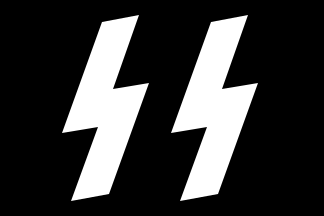Schutzstaffel
Introduction
The Schutzstaffel (SS; also stylized as Runic "ᛋᛋ" with Armanen runes; literally "Protection Squadron") was a major paramilitary organization under Adolf Hitler and the National Socialist German Workers' Party (NSDAP; Nazi Party) in Nazi Germany. It began with a small guard unit known as the Saal-Schutz (Hall-Protection) made up of NSDAP volunteers to provide security for party meetings in Munich. In 1925, Heinrich Himmler joined the unit, which had by then been reformed and given its final name. Under his direction (1929–45), it grew from a small paramilitary formation to one of the most powerful organizations in Nazi Germany. From 1929 until the regime's collapse in 1945, the SS was the foremost agency of security, surveillance, and terror within Germany and German-occupied Europe.
The two main constituent groups were the Allgemeine SS (General SS) and Waffen-SS (Armed SS). The Allgemeine SS was responsible for enforcing the racial policy of Nazi Germany and general policing, whereas the Waffen-SS consisted of combat units of troops within Nazi Germany's military. A third component of the SS, the SS-Totenkopfverbände (SS-TV), ran the concentration camps and extermination camps. Additional subdivisions of the SS included the Gestapo and the Sicherheitsdienst (SD) organizations. They were tasked with the detection of actual or potential enemies of the Nazi state, the neutralization of any opposition, policing the German people for their commitment to Nazi ideology, and providing domestic and foreign intelligence.
The SS was the organization most responsible for the genocidal killing of an estimated 5.5 to 6 million Jews and millions of other victims in the Holocaust.[1] Members of all of its branches committed war crimes and crimes against humanity during World War II (1939–45). The SS was also involved in commercial enterprises and exploited concentration camp inmates as slave labor. After Nazi Germany's defeat, the SS and the NSDAP were judged by the International Military Tribunal at Nuremberg to be criminal organizations. Ernst Kaltenbrunner, the highest-ranking surviving SS officer at the time, was found guilty of crimes against humanity at the Nuremberg trials and hanged in 1946.
